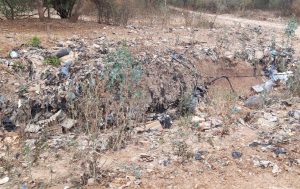Plastic Everywhere
In recent decades, the generation of solid waste has grown exponentially. Overall, the amount of municipal solid waste in low-income countries has seen a significant increase, rising from around 0.64 billion metric tons in 1970 to 2 billion metric tons in 2019. Recent studies indicate that the global volume of waste is expected to increase by more than 60% by 2050. This trend raises particular concerns for low-income countries, where only 4% of waste is currently recycled, and the lifetime cost of plastic is 10 times higher compared to wealthy countries.



Photographs: Wastescapes in Guarani Communities (Captured by the author in 2023)
Explaining the Surge
While urban population has been increasing, the explosion in the quantity of urban waste is not fortuitous. A simple correlation between the expansion in the number of urban residents and the meteoric rise in the amount of plastic waste is simplistic. It is more compelling to explain the surge in terms of rising consumerism. Western societies have become quite ‘plastic’, a dynamic that is increasingly becoming a reality in the Global South. Fragments of partially buried bags, remnants of bottles, rusted metals, and rags that might once have been clothing are increasingly dominant ornaments in the landscape of Guarani communities in the Cordillera Department of Bolivia.
While waste is not a new phenomenon, certain waste materials, particularly plastics, have brought about new considerations due to their non-degradability and potential health and environmental impacts. In the Global South, private companies and state authorities tackle this problem, but they face considerable difficulties in providing socially and ecologically sound solutions. In indigenous contexts, studies demonstrate that plastic waste accumulation is already causing adverse impacts and posing unprecedented management challenges with significant ontological and epistemological implications.
As an anthropologist, I explore the complex relationship between this escalating waste crisis and its multifaceted implications on Indigenous lifeways in the Bolivian lowlands. Known as ‘iti’ in Guarani language, waste is a major problem in Guarani communities. As this is a reflection of ecological imperialism, it is connected to broader patterns of inequality, domination and cultural displacement, which have roots and precedents in historical process of colonialization.
What can be done?
To be ‘wasted’ often connotes being intoxicated beyond redemption. It is a common sight on Friday nights in many parts of the world. But the plastic waste toxic is not subject to such paralysis. Indeed, contrary to mainstream wastefulness in urban centres, Guarani people maintain ingrained practices of reusing, recycling, and repurposing that prolong the lifespan of waste items. However, these practices have intrinsic limitations in addressing local plastic waste accumulation for several reasons. First, the elimination and profound transformation of plastics relies solely on advanced technology, which remains out of reach for the majority of the population and even some nations. When plastics can no longer be reused, community members have no other option but to dispose of them. Second, most communities in the area lack access to public waste collection systems, forcing them to take full responsibility for their own waste. As waste cannot be externalised, they must bear the associated risks. Communities near urban centres could access public waste collection services. However, this solution has been declined by some communities due to the additional costs, which can strain limited family budgets, and potential disruptions to traditional habits, as it could lead to their semi-urbanization. Thus, as it stands, household waste poses new environmental and health risks, while its seemingly effective solutions still cannot avoid reinforcing colonial dynamics.
Moreover, urban waste finds its way into Guarani communities through illegal dumping and municipal landfilling. These activities not only cause significant environmental degradation but also perpetuate historical exploitative and abusive relationships over indigenous lands. However, Guarani communities do not passively accept this situation. They have mobilised and confronted municipal authorities by organizing blockades and taking every possible measure to mitigate risks and even secure benefits, seizing opportunities for income generation to support their local life projects. In particular instances, waste has become a source of wealth.
As decolonial thinkers argue, environmental destruction cannot be disconnected from historical dynamics of racial, gender, colonial, and imperial domination. In this “world of many worlds,” the enduring violence of colonial forms of inhabitation has driven environmental transformation while simultaneously rendering invisible and transforming those multiple ways of inhabiting and thinking about the earth that clashed with modernist schemes. In this sense, the waste crisis must be understood as rooted in a long history of pervasive structural inequalities which, in turn, perpetuate violence against Indigenous people and their life projects.
Indigenous and Exogenous
Waste accumulation is widely recognised as a pressing global problem. It is driven by ecological imperialism. Its environmental burdens, distributed unevenly, places particular challenges on historically marginalised communities. Recent research illustrates this point. Despite these disparities, it is inaccurate to portray Indigenous people solely as victims for they actively confront waste problems, navigate power structures, and transform hostile conditions into opportunities for continuation. Waste places the dialectical relationship between indigenous and exogenous forces into sharp focus. Understanding how Indigenous peoples engage with these new waste scenarios is crucial. Appreciating the problem helps to shed light on systemic socio-environmental inequalities and power dynamics inherent within the broader framework of capitalist – indeed imperial – consumerist disposal while at the same time revealing the specific terms through which they assert their own worlds.
